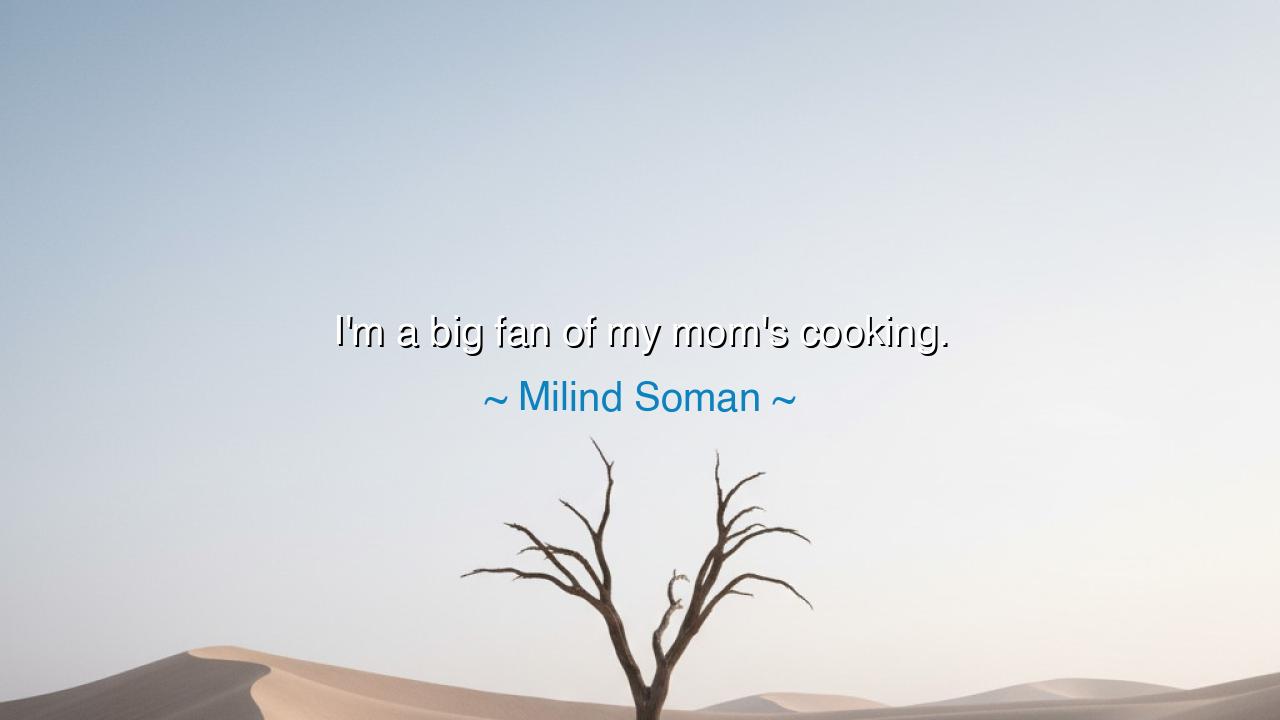
I'm a big fan of my mom's cooking.






When Milind Soman said, “I’m a big fan of my mom’s cooking,” his words may seem simple, almost playful — but beneath their warmth lies a profound reflection on love, memory, and the sacredness of nourishment. In every culture and every age, the act of feeding another has been more than mere sustenance; it has been a form of worship, an expression of care woven through the daily rhythm of life. To say one is a fan of one’s mother’s cooking is to say, “I revere the love that made me who I am.” It is an acknowledgment that food, in its truest form, carries the spirit of the one who prepares it — a spirit that shapes not only the body, but the soul.
In the days of the ancients, it was said that the hearth was the heart of the home, and the mother, its eternal flame. Through her hands, the elements were transformed — grain into bread, spice into harmony, hunger into gratitude. Each meal was not simply eaten; it was shared, binding families into one spirit. Milind Soman, a man known for his strength and endurance, does not praise luxury or extravagance in this quote — he honors simplicity. He reminds us that greatness often begins in the smallest acts: the aroma of a mother’s curry, the warmth of rice served by loving hands, the quiet ritual of family gathered together. Such memories become the foundation of resilience, teaching that nourishment is not only of the flesh, but of the heart.
The story of Odysseus, the wandering hero of Greece, tells us much the same. After years of war and storm, after tasting the feasts of kings and the temptations of immortals, what did Odysseus crave most? Not gold, nor glory, but the simple bread of Ithaca, the food of home, the taste of love long lost. His hunger was not only for food, but for the peace that comes from belonging. In this way, Milind’s words echo across centuries: even in an age of speed and spectacle, the truest nourishment still comes from home — from the hands that loved us before the world ever knew our name.
There is wisdom, too, in the humility of his statement. To be a “fan” of one’s mother’s cooking is to bow before something greater than oneself — to admit that the comfort of home surpasses all fame, wealth, or achievement. For no matter how far one travels, the taste of childhood lingers like a sacred echo. In the strength of an athlete, in the confidence of a public figure, there still lives the child who once sat at the table, waiting for the sound of a ladle against a pot. This is a reminder that even the mighty are shaped by tenderness, and that the hands that feed us are the hands that teach us how to love.
Let us also remember that a mother’s cooking is not only an act of care, but of art — one born from endurance, intuition, and devotion. Long before the word “chef” existed, mothers were the silent creators of flavor, experimenting not for applause, but for joy. In their food is wisdom passed through generations — the spice blends of ancestors, the patient craft of time, the alchemy of turning scarcity into abundance. To praise one’s mother’s cooking is to honor an unbroken lineage of creativity, the quiet genius that thrives in ordinary kitchens yet sustains the entire world.
But there is something more — something deeply human. To love the food of one’s mother is to carry gratitude wherever life takes us. In a world obsessed with new tastes, foreign flavors, and endless novelty, Milind’s words remind us to return to the source. The true feast is not in variety, but in meaning. To eat what your mother once cooked is to eat a piece of your own history, to be reminded of who you are and where you come from. It is a way of staying rooted even as the winds of modern life pull us far from home.
So, dear listener, let this saying become your own: cherish the hands that feed you. Remember that behind every meal lies labor, love, and memory. When you eat, eat with gratitude. When you cook, cook with heart. If your mother still lives, taste her food as if it were the finest gift in the world; if she is gone, cook something she once made and let her spirit rise in the scent of your kitchen. For in honoring her cooking, you honor the eternal bond between nourishment and love — the bond that sustains not only the body, but all that is human within us.
Thus, in Milind Soman’s gentle words lies a timeless truth: the greatest flavors are not those crafted by fame, but by love. The hearth is the first temple, the mother the first teacher, and every meal shared in gratitude is a form of prayer. Eat, then, with reverence — and remember the warmth from which you came.






AAdministratorAdministrator
Welcome, honored guests. Please leave a comment, we will respond soon